US Envoy For Iran Briefs Saudi Diplomat On Vienna Talks
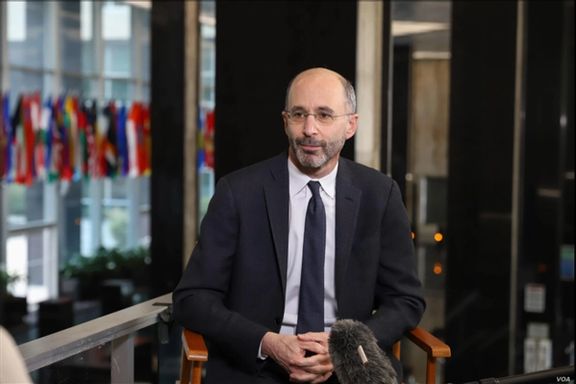
US Special Envoy for Iran Rob Malley has met with Saudi Arabia’s ambassador to the international organizations to discuss the latest developments in Iran nuclear talks.

US Special Envoy for Iran Rob Malley has met with Saudi Arabia’s ambassador to the international organizations to discuss the latest developments in Iran nuclear talks.
Prince Abdullah bin Khalid Al Saud met Malley on Friday after separate meetings with representatives of France and Russia this week.
The US State Department said earlier in the week that such periodic meetings “are part of the US commitment to consulting closely with our regional partners on the ongoing talks”.
Russian chief negotiator Mikhail Ulyanov tweeted a photo of his meetingwith the Saudi envoy, saying that he briefed the Saudi side on the latest developments in the Vienna talks.
Last week, Saudi Arabia’s foreign minister Prince Faisal bin Farhan Al Saud reiterated Riyadh’s concerns about Iran’s “destabilizing role” and “transgressions” in its nuclear program.
Riyadh and Tehran held talks last year to reduce tensions with the aim of restoring diplomatic ties broken since January 2016. So far, the talks have been exploratory with no tangible results.
The eighth round of talks to salvage the 2015 nuclear agreement, officially known as the Joint Comprehensive Plan of Actions, is underway in Vienna. However, Iranian and US officials don’t meet face-to-face, communicating through other participants.
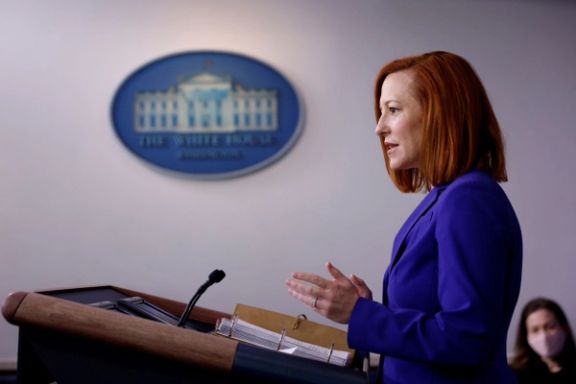
As nuclear talks with Iran made “modest progress,” the White House Thursday refused to say who was behind the attacks on US bases in Iraq and Syria this week.
White House spokesperson Jen Psaki in her daily briefing evaded the question is Iran-backed groups were responsible for drone and rocket attacks against bases where US troops are stationed in Iraq and Syria.
“But here, officially, we don't have any specific attribution today, in terms of the particular group by name or groups who might be responsible for this. We don't have anything new on that front,” she said.
On Thursday, however, an Iraqi militant group tied to Iran had already claimed responsibility. In a statement published by al-Mayadeen, Qasem al-Jabbarin (which means Smasher of the Oppressors) claimed responsibility for the Wednesday attacks on Ain al-Asad air base west of Baghdad.
The White House appeared to be avoiding any statement that would directly implicate Iran in the attacks as nuclear talks continued in Vienna to find ways to revive the 2015 nuclear agreement known as JCPOA.
But Psaki did allude to the possibility that the attacks could be tied to the nuclear negotiations. “We can't say definitively who caused them or why the attacks seem to have stepped up. It is certainly possible that it can be related to the talks in Vienna or the anniversary of the Soleimani strike,” The spokesperson said. Psaki then referred reporters to statements made by the Pentagon, which also indirectly referred to Iran.
The State Department meanwhile reiterated that negotiators in Vienna have made “modest progress” and again warned that time is short as Iran makes more progress in its nuclear program.
“If we don’t soon reach an understanding on mutual return to compliance, Iran’s accelerating nuclear steps will hollow out those nonproliferation benefits the JCPOA conveyed, and we will have to consider a different path forward. That is a matter of weeks; it is certainly not a matter of months,” State Department spokesperson Ned Price said. But he made clear there are no definite deadlines as to when an assessment will be made that Iran’s nuclear progress has gone too far.
“But again, you have heard us speak to this not as a clock, as a standard clock, but rather on the basis of a technical assessment of Iran’s nuclear program rather than any sort of temporal clock with a date that has long been fixed,” Price said.
Critics have said that without a clear deadline, Iran can play for time and gain leverage by a far-advanced nuclear program. The United States and its three European allies in the talks – France, Germany and the United Kingdom – have been warning about time being short since early December.
Meanwhile, Iranian media on Friday continued to issue optimistic reports on the talks, saying that negotiators are maling progress.
Price, however, reiterated that if the US gets to the point where the JCPOA is deemed meaningless by Iran’s nuclear progress, “we will consider a different path.”
In an opinion article in the Wall Street Journalon Thursday, two authors argued that the United States should quickly prepare a military option to destroy Iran’s nuclear infrastructure and set back its program for years. The demonstration that Washington is serious about a military option, might coax Iran to negotiate seriously, and if all fails, President Joe Biden will have the option to act in a timely manner to stop Iran from building a bomb.

Iran's chief envoy in Vienna nuclear talks says South Korea must release Tehran's frozen funds no matter the outcome of the negotiations to restore the JCPOA.
According to the official government news website IRNA, Ali Bagheri-Kani made the remarks on Thursday as he met with Korean Vice Foreign Minister Choi Jong-Kun on the sidelines of the official negotiations.
He added that "unilateral US sanctions cannot justify the non-payment of debts to Iran".
The Korean diplomat said in a tweeton Thursday, “We exchanged views on our bilateral relationship including the frozen fund. Korea and Iran will work together and preserve our historically important relationship.”
Washington says it will waive sanctions on South Korea over frozen Iranian assets only with “everything” agreed in Vienna nuclear talks.
Since introducing ‘maximum pressure’ sanctions and leaving the JCPOA in 2018, the US has imposed banking sanctions on Iran. Two South Korea banks hold $7-9 billion of Iranian money, owed for oil imports.
Iran has funds frozen not just in South Korea but in Japan, Iraq, India, and China, mainly for oil and gas deliveries. The semi-official Iranian Students News Agency (ISNA) reported November 13 that Iran's assets frozen abroad totaled $50 billion, with $8 billion in South Korea, $3 billion in Japan, and $6 billion in Iraq.
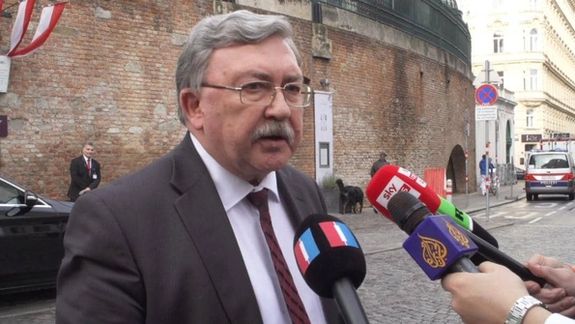
Seeking progress in reviving the 2015 Iran nuclear agreement, a senior South Korean diplomat has met representatives of world powers in Vienna.
As a major past buyer of Iranian oil, Seoul holds around $7 billion in payments owed to Iran for purchases made before the United States imposed sanctions on Tehran’s international banking transactions. Washington began its ‘maximum pressure’ in 2018 as it left the 2015 nuclear deal, the Joint Comprehensive Plan of Action (JCPOA).
The South Korean foreign ministry said Thursday that Choi Jong-kun, first vice foreign minister, had called for “positive progress” with talks at "a critical juncture.” In meetings with – among others – Robert Malley, US special envoy for Iran, and Enrique Mora, the senior European Union official chairing formal talks in Vienna, Choi had “reaffirmed that our government will continue diplomatic efforts for progress…[and] actively play any role that it can possibly play.”
While two Korean banks hold money owed Iran for oil sales before ‘maximum pressure’ kicked in, the resulting stand-off with Tehran has disrupted previously lucrative bilateral trade, with Tehran restricting imports of Korean consumer durables.
Ulyanov tweeting photos
With both US spokesman Ned Price Tuesday and chief Iranian negotiator Ali Bagheri-Kani Wednesday intimating talks were progressing, Russia’s lead negotiator in Vienna Mikhail Ulyanov tweeted Wednesday a photo showing remaining JCPOA participants, without Iran, meeting the US delegation.
As the US left the JCPOA in 2018, formal talks involve remaining signatories – China, France, Germany, Iran, Russia, and the United Kingdom – with Washington taking part only indirectly. Sticking to JCPOA structures and to its insistence that the US as the party leaving the agreement should mend its ways before re-joining, Tehran refuses face-to-face meetings with Washington.
Ulyanov tweeted that the process was moving “slowly but steadily.” The Russian negotiator, who is Moscow’s ambassador to the International Atomic Energy Agency, seems to have taken on a greater liaison role with tensions rising, at least in public, between Iran and the ‘E3’ of France, Germany and the United Kingdom.
“Regular meetings of JCPOA participants (without Iran) and the US after 6pm provide a good opportunity to take stock of the latest developments in the course of the Vienna talks,” Ulyanov tweeted.
The Russian envoy also noted that any deadlines for the talks were fluid, apparently distancing himself from European pronouncements that time is running out due to Iran’s continuing expansion its atomic program under steps began in 2019 beyond JCPOA limits.
‘European spies’
In Washington this week, German Foreign Minister Annalena Baerbock said Tehran had squandered trust and that limited time remained to save the JCPOA. After transatlantic tensions during the administration of Donald Trump (2016-20), Europe has sought a more positive relationship with President Joe Biden.
Baerbock tweeted Wednesday a picture with Antony Biden, US Secretary of State, with a message that there was “no alternative to dialogue” and that the two sides had agreed to “collaborate closely” over Russia, presumably a reference to tensions over Ukraine rather than to the Vienna talks.
The latest Iranian broadside aimed at the Europeans came from Mahmoud Abbaszadeh Meshkini, spokesman of parliament’s National Security and Foreign Policy Commission, in an interview with the official news agency IRNA published Thursday.
Meshkini said that with Vienna talks reaching “the content of the proposals” Iranian negotiators would not be deterred by “European spies” or by talk of deadlines.
Meshkini suggested discussions were continuing on proposals put forward by Iran and by others. The Vienna talks, which began back in April, have struggled to agree which US sanctions breach the JCPOA and exactly how Iran’s nuclear program, expanded and refined since 2019, could be brought back within JCPOA limits.
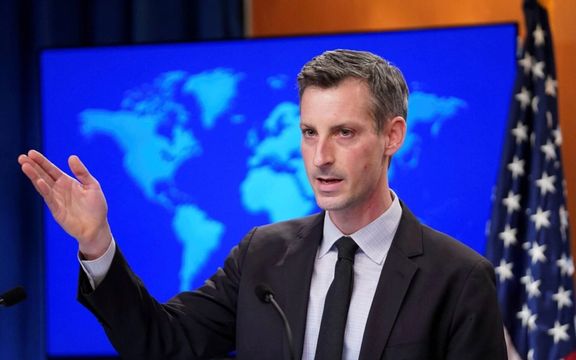
Washington will waive possible sanctions on South Korea over frozen Iranian assets only with “everything” agreed in Vienna nuclear talks, a spokesman has said.
With Choi Jong-kun, South Korea’s first vice-foreign minister, due in Vienna, US State Department Spokesman Ned Price said Tuesday that progress over the Iranian assets depended on the nuclear talks, which aim to revive the 2015 Iran agreement, the JCPOA (Joint Comprehensive Plan of Action).
"Nothing is agreed until everything is agreed when it comes to these issues," Price said. "So I wouldn’t want to get ahead of where we are."
Price said that sanctions relief and the steps that the United States would take together with the nuclear steps that Iran would need to take are at the heart of the Vienna negotiations.
Price said any progress in talks last week was "modest." He reiterated that Washington’s goal was to address the “proliferation threat” of Iran’s nuclear program through “diplomacy and to test the proposition as to whether a mutual return to compliance with the JCPOA remains a possibility."
Since introducing ‘maximum pressure’ sanctions and leaving the JCPOA in 2018, the US has threatened punitive action against any third party buying Iran’s oil or dealing with its financial sector. Two South Korea banks hold $7-9 billion of Iranian money, largely owed for oil imports, despite Iran’s protests. In 2021 Iran detained a Korean tanker and last year banned the import of home appliances made by the two leading Korean manufacturers.
Iran has assets frozen not just in South Korea but in Japan, Iraq, India, and China, largely for money owed for oil shipments. The semi-official Iranian Students News Agency (ISNA) reported November 13 that Iran's assets frozen abroad totaled $50 billion, with $8 billion in South Korea, $3 billion in Japan, and $6 billion in Iraq.
Iranian officials have made repeated claims that funds would be released, from Iraq in March for instance, but have not subsequently confirmed transfers. Iraq owes Iran around $7 billion for gas and electricity.
Some Iraqi power stations are idle due to a fall in Iranian gas supplies. Iraqi electricity ministry spokesman Ahmed Moussa said Tuesdaythat discussions were continuing with Iran's energy ministry to pay debts with deposits in Tehran's credit fund at Trade Bank of Iraq.
Moussa said gas imports from Iran had fallen from 50 million to 8.5 million cubic meters a day, cutting 4,000 megawatts from the national grid. Iraq’s electricity production has remained low due to various problemsincluding low water levels, supplying only around a third of peak winter demand.
"Iran’s accelerating nuclear steps will increasingly diminish the non-proliferation benefits of the JCPOA" if a rapid understanding on mutual return to compliance is not reached, which Price said remains in the national interest of the US. He stressed. "Iran needs to exercise restraint in its nuclear program and pursue negotiations in Vienna seriously… our goal is to address that proliferation threat through diplomacy and to test the proposition as to whether a mutual return to compliance with the JCPOA remains a possibility."
"The clock will run out" but "not on a predetermined date", the US spokesman said.
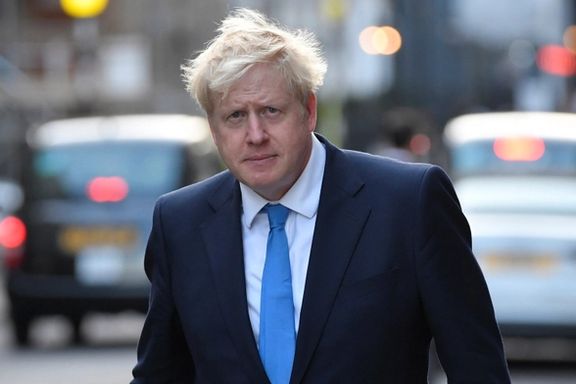
British Prime Minister Boris Johnson warned Iran on Tuesday that time was running out to salvage a 2015 nuclear accord with major powers.
In a call with Israeli Prime Minister Naftali Bennett, Johnson discussed the ongoing talks on the Iran nuclear deal in Vienna.
"The prime minister said the UK wants to see the negotiations in Vienna lead to full restoration of the JCPOA, but that we need Iran to engage in good faith," a Downing Street spokesman said. "The diplomatic door is open, but time is running out to reach an agreement."
European participants in the talks, the UK, France and Germany have been warning Iran that the talks cannot drag on.
Iran interrupted the Vienna negotiations to restore the JCPOA in June for five months and returned to talks in late November. Diplomats say so far, some limited progress has been made but major issues remain to be solved.
In the meantime, Iran continues high-level uranium enrichment, deepening concerns that it might be aiming to build more leverage as it gets closer to building a nuclear bomb.
Talks continue in Vienna with different delegations holding bilateral and multilateral discussions. Iran’s chief negotiator Ali Bagheri-Kani Tuesday met with Russia’s envoy Mikhail Ulyanov, but the contents of the talks have not been disclosed.
With reporting by Reuters